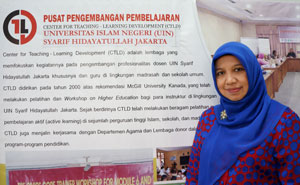Dr Farida Hamid certainly knows a lot about being in charge. As director of an organisation working to improve the quality of teaching at Islamic schools (madrasah) in Indonesia–and as a mother of eight–she is used to leading others.
Dr. Farida, who went from being a madrasah student to the holder of a PhD in Education, says girls' education in Indonesia has changed for the better.
'As a young girl, I remember some of my friends dropping out of high school to get married, or not believing they could pursue higher education,' she said. 'But nowadays, girls and women see that there are many more opportunities than just getting married.'
Dr Farida currently leads the Centre for Teaching–Learning Development (CTLD) at the National Islamic University in Jakarta, which aims to develop teaching professionalism and methodology skills amongst Islamic educators. It is one of eleven centres working with Australia's Education Partnership with Indonesia to improve the quality of more than 1,000 Islamic schools throughout the country. Through the Education Partnership, the Government of Australia works alongside the Indonesian Ministry of Religious Affairs to support madrasah with grants of A$10,000 to use over a period of 18 months.
The Education Partnership provides these grants to help the schools meet National Education Standards and prepare for accreditation through professional development for their principal, teachers and personnel, updated education materials and minor physical improvements. The program aims to support 1,500 madrasah by June 2016.
Centres like Dr Farida's provide training and mentors to guide the madrasah in grant implementation and help them improve the quality of their management and teaching and learning methods.
'What you find in Indonesia is that even when teachers have knowledge, they don't necessarily know how to deliver that knowledge,' Dr Farida said. 'Through our training, we try to help educators understand better how to communicate with their students so the kids can really apply what they learn in the classroom.'
Madrasah make up an important part of the school system in Indonesia–around twenty per cent of children in Indonesia attend madrasah, and madrasah have a higher percentage of female students than state schools.
Dr Farida has been working in Islamic education for the last twenty years, so she knows the system in and out–especially since her education began in a madrasah around 45 years ago.
'My children ask me if working with madrasah is an obligation or an obsession,' Dr Farida said with a laugh.
'I was inspired by my mother to go into education,' Dr Farida continued. 'My mother couldn't even read, but she taught my eight brothers and sisters and me to think progressively, that we could have what we wanted in life regardless of gender.'
Indonesia has made great strides in increasing school enrolment both of girls and of boys and has virtually evened out the gender gap at primary, secondary and tertiary levels. However, more subtle gender concerns persist. Many teachers lack awareness on gender issues, textbooks reinforce negative gender stereotypes, and management of madrasah, state schools and higher institutions tends to be male dominated.
'You do still find textbooks that show only mothers cooking while men read the newspaper, for example,' Dr Farida said. 'Or school books show girls cooking while boys are playing sports–this goes for both madrasah and public schools.'
Dr Farida has advised the Ministry of Religious Affairs on how to modify these textbooks to make them more gender equal.
'My husband has helped me a lot with our children, which is not typical in my culture,' she said. 'But we have actually tried to change the mindset of people around us to show that men and women can participate equally in raising a family.'
'Throughout my whole life, I've seen that as a woman, you have to think intelligently and learn how to reach your goals, regardless of the obstacles,' she said.
'My mother told me that no matter your profession, you're always going to be educating someone else–especially as a mother,' Dr Farida said. 'I have tried to bring that into my career working with madrasah in Indonesia.'

